Myer Australia: A Case Study on Corporate Governance and CSR
VerifiedAdded on 2023/06/12
|6
|1810
|367
Case Study
AI Summary
This case study examines Myer Australia's corporate governance and corporate social responsibility (CSR) initiatives. It highlights the importance of these practices in driving organizational growth and societal development. The study explores Myer's focus on stakeholder engagement, environmental responsibility, and ethical business practices, including efforts to reduce plastic and paper use and improve green packaging. While the company has made strides in energy consumption reduction and the use of organic materials, challenges remain, particularly in managing its carbon footprint. The case study also emphasizes the importance of transparent financial reporting through IFRS and effective communication with stakeholders. Overall, Myer's commitment to CSR and corporate governance demonstrates its dedication to sustainable development and societal contribution. Desklib provides access to similar case studies and solved assignments for students.
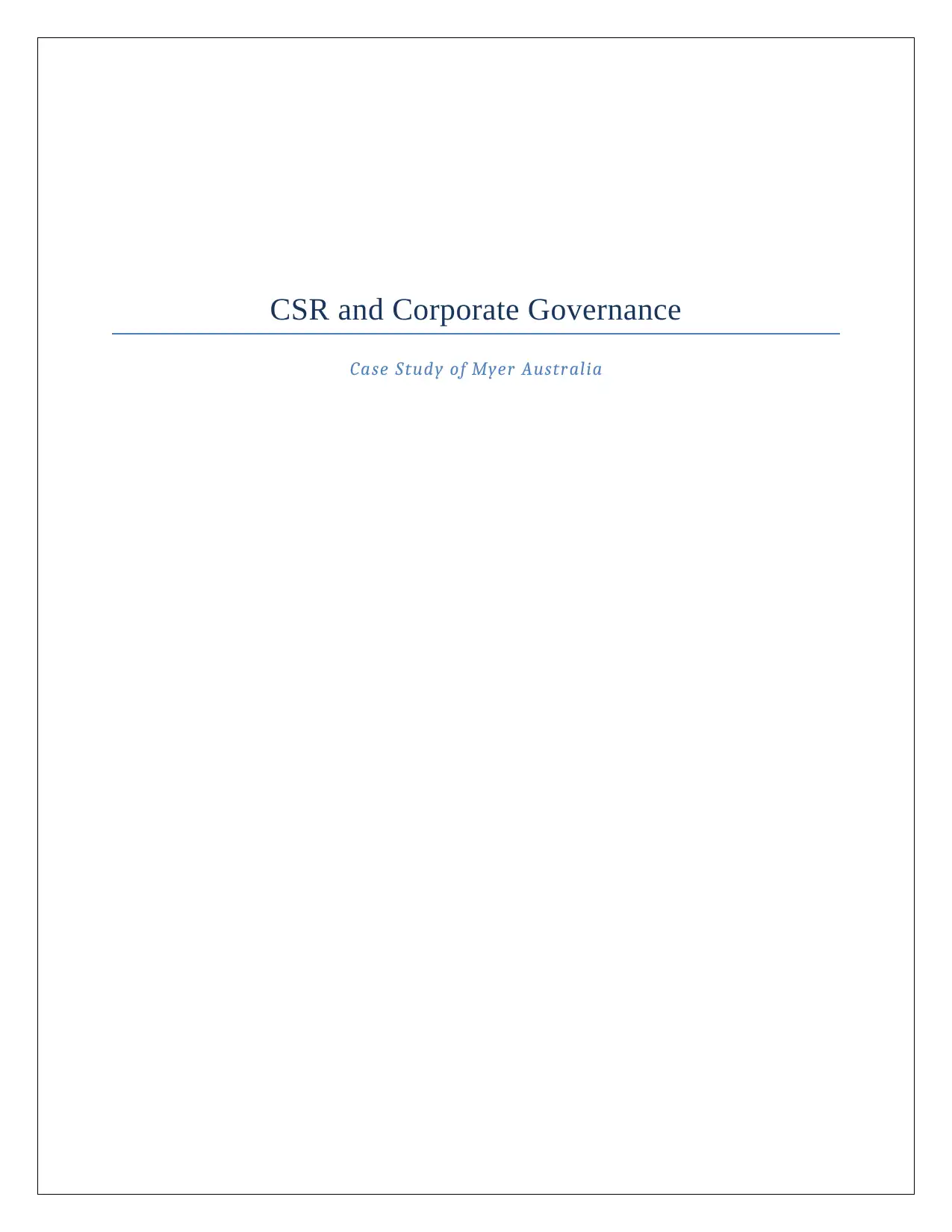
CSR and Corporate Governance
Case Study of Myer Australia
Case Study of Myer Australia
Paraphrase This Document
Need a fresh take? Get an instant paraphrase of this document with our AI Paraphraser
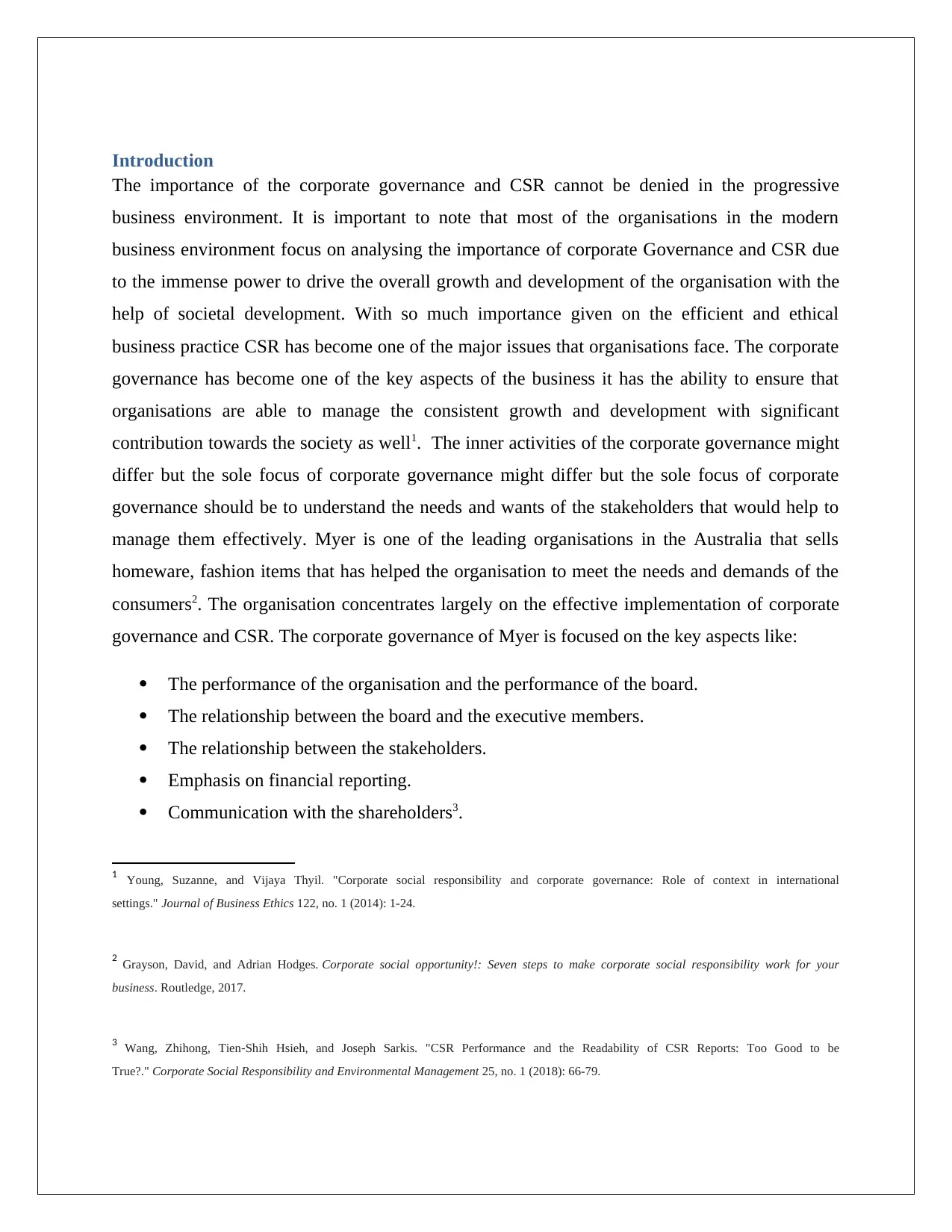
Introduction
The importance of the corporate governance and CSR cannot be denied in the progressive
business environment. It is important to note that most of the organisations in the modern
business environment focus on analysing the importance of corporate Governance and CSR due
to the immense power to drive the overall growth and development of the organisation with the
help of societal development. With so much importance given on the efficient and ethical
business practice CSR has become one of the major issues that organisations face. The corporate
governance has become one of the key aspects of the business it has the ability to ensure that
organisations are able to manage the consistent growth and development with significant
contribution towards the society as well1. The inner activities of the corporate governance might
differ but the sole focus of corporate governance might differ but the sole focus of corporate
governance should be to understand the needs and wants of the stakeholders that would help to
manage them effectively. Myer is one of the leading organisations in the Australia that sells
homeware, fashion items that has helped the organisation to meet the needs and demands of the
consumers2. The organisation concentrates largely on the effective implementation of corporate
governance and CSR. The corporate governance of Myer is focused on the key aspects like:
The performance of the organisation and the performance of the board.
The relationship between the board and the executive members.
The relationship between the stakeholders.
Emphasis on financial reporting.
Communication with the shareholders3.
1 Young, Suzanne, and Vijaya Thyil. "Corporate social responsibility and corporate governance: Role of context in international
settings." Journal of Business Ethics 122, no. 1 (2014): 1-24.
2 Grayson, David, and Adrian Hodges. Corporate social opportunity!: Seven steps to make corporate social responsibility work for your
business. Routledge, 2017.
3 Wang, Zhihong, Tien‐Shih Hsieh, and Joseph Sarkis. "CSR Performance and the Readability of CSR Reports: Too Good to be
True?." Corporate Social Responsibility and Environmental Management 25, no. 1 (2018): 66-79.
The importance of the corporate governance and CSR cannot be denied in the progressive
business environment. It is important to note that most of the organisations in the modern
business environment focus on analysing the importance of corporate Governance and CSR due
to the immense power to drive the overall growth and development of the organisation with the
help of societal development. With so much importance given on the efficient and ethical
business practice CSR has become one of the major issues that organisations face. The corporate
governance has become one of the key aspects of the business it has the ability to ensure that
organisations are able to manage the consistent growth and development with significant
contribution towards the society as well1. The inner activities of the corporate governance might
differ but the sole focus of corporate governance might differ but the sole focus of corporate
governance should be to understand the needs and wants of the stakeholders that would help to
manage them effectively. Myer is one of the leading organisations in the Australia that sells
homeware, fashion items that has helped the organisation to meet the needs and demands of the
consumers2. The organisation concentrates largely on the effective implementation of corporate
governance and CSR. The corporate governance of Myer is focused on the key aspects like:
The performance of the organisation and the performance of the board.
The relationship between the board and the executive members.
The relationship between the stakeholders.
Emphasis on financial reporting.
Communication with the shareholders3.
1 Young, Suzanne, and Vijaya Thyil. "Corporate social responsibility and corporate governance: Role of context in international
settings." Journal of Business Ethics 122, no. 1 (2014): 1-24.
2 Grayson, David, and Adrian Hodges. Corporate social opportunity!: Seven steps to make corporate social responsibility work for your
business. Routledge, 2017.
3 Wang, Zhihong, Tien‐Shih Hsieh, and Joseph Sarkis. "CSR Performance and the Readability of CSR Reports: Too Good to be
True?." Corporate Social Responsibility and Environmental Management 25, no. 1 (2018): 66-79.
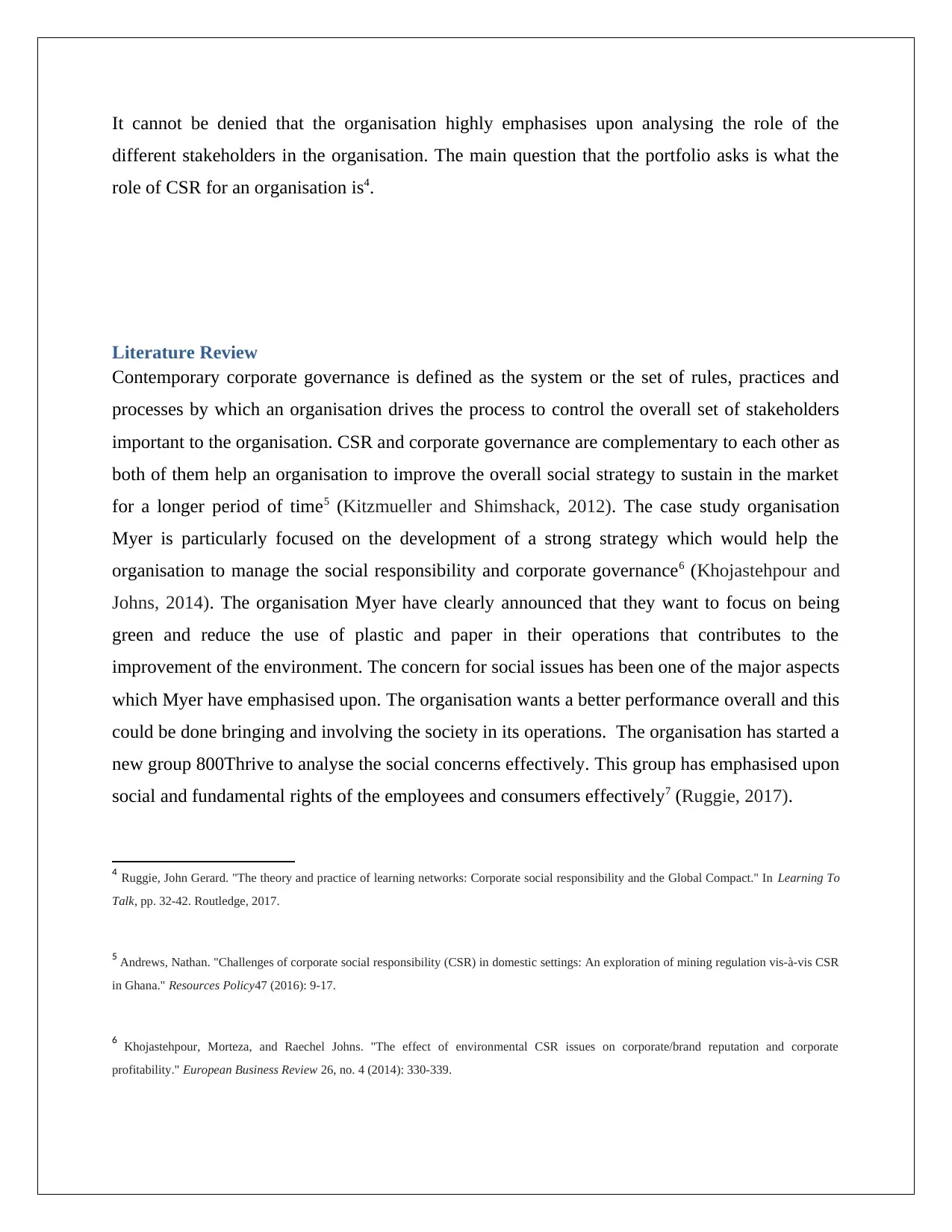
It cannot be denied that the organisation highly emphasises upon analysing the role of the
different stakeholders in the organisation. The main question that the portfolio asks is what the
role of CSR for an organisation is4.
Literature Review
Contemporary corporate governance is defined as the system or the set of rules, practices and
processes by which an organisation drives the process to control the overall set of stakeholders
important to the organisation. CSR and corporate governance are complementary to each other as
both of them help an organisation to improve the overall social strategy to sustain in the market
for a longer period of time5 (Kitzmueller and Shimshack, 2012). The case study organisation
Myer is particularly focused on the development of a strong strategy which would help the
organisation to manage the social responsibility and corporate governance6 (Khojastehpour and
Johns, 2014). The organisation Myer have clearly announced that they want to focus on being
green and reduce the use of plastic and paper in their operations that contributes to the
improvement of the environment. The concern for social issues has been one of the major aspects
which Myer have emphasised upon. The organisation wants a better performance overall and this
could be done bringing and involving the society in its operations. The organisation has started a
new group 800Thrive to analyse the social concerns effectively. This group has emphasised upon
social and fundamental rights of the employees and consumers effectively7 (Ruggie, 2017).
4 Ruggie, John Gerard. "The theory and practice of learning networks: Corporate social responsibility and the Global Compact." In Learning To
Talk, pp. 32-42. Routledge, 2017.
5 Andrews, Nathan. "Challenges of corporate social responsibility (CSR) in domestic settings: An exploration of mining regulation vis-à-vis CSR
in Ghana." Resources Policy47 (2016): 9-17.
6 Khojastehpour, Morteza, and Raechel Johns. "The effect of environmental CSR issues on corporate/brand reputation and corporate
profitability." European Business Review 26, no. 4 (2014): 330-339.
different stakeholders in the organisation. The main question that the portfolio asks is what the
role of CSR for an organisation is4.
Literature Review
Contemporary corporate governance is defined as the system or the set of rules, practices and
processes by which an organisation drives the process to control the overall set of stakeholders
important to the organisation. CSR and corporate governance are complementary to each other as
both of them help an organisation to improve the overall social strategy to sustain in the market
for a longer period of time5 (Kitzmueller and Shimshack, 2012). The case study organisation
Myer is particularly focused on the development of a strong strategy which would help the
organisation to manage the social responsibility and corporate governance6 (Khojastehpour and
Johns, 2014). The organisation Myer have clearly announced that they want to focus on being
green and reduce the use of plastic and paper in their operations that contributes to the
improvement of the environment. The concern for social issues has been one of the major aspects
which Myer have emphasised upon. The organisation wants a better performance overall and this
could be done bringing and involving the society in its operations. The organisation has started a
new group 800Thrive to analyse the social concerns effectively. This group has emphasised upon
social and fundamental rights of the employees and consumers effectively7 (Ruggie, 2017).
4 Ruggie, John Gerard. "The theory and practice of learning networks: Corporate social responsibility and the Global Compact." In Learning To
Talk, pp. 32-42. Routledge, 2017.
5 Andrews, Nathan. "Challenges of corporate social responsibility (CSR) in domestic settings: An exploration of mining regulation vis-à-vis CSR
in Ghana." Resources Policy47 (2016): 9-17.
6 Khojastehpour, Morteza, and Raechel Johns. "The effect of environmental CSR issues on corporate/brand reputation and corporate
profitability." European Business Review 26, no. 4 (2014): 330-339.
⊘ This is a preview!⊘
Do you want full access?
Subscribe today to unlock all pages.

Trusted by 1+ million students worldwide
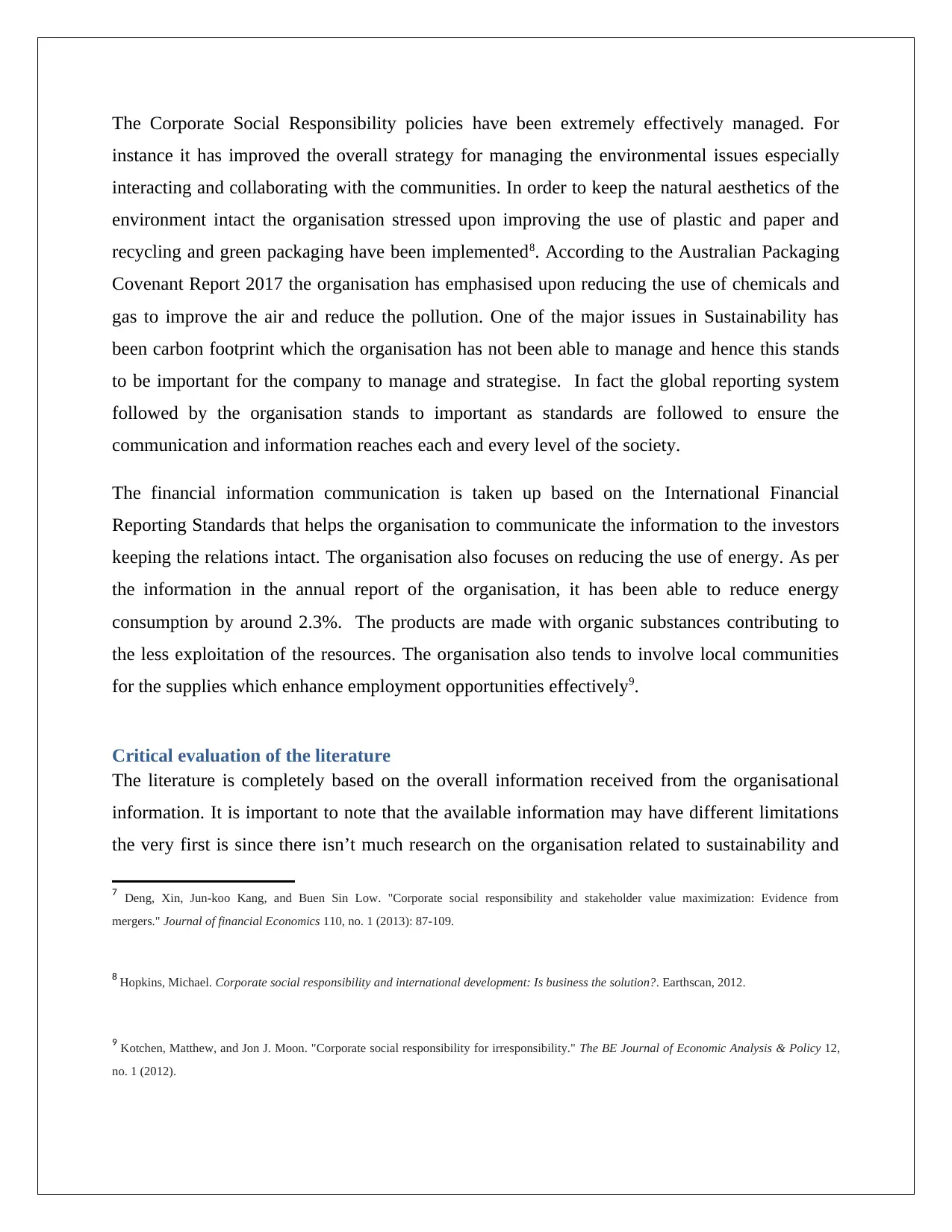
The Corporate Social Responsibility policies have been extremely effectively managed. For
instance it has improved the overall strategy for managing the environmental issues especially
interacting and collaborating with the communities. In order to keep the natural aesthetics of the
environment intact the organisation stressed upon improving the use of plastic and paper and
recycling and green packaging have been implemented8. According to the Australian Packaging
Covenant Report 2017 the organisation has emphasised upon reducing the use of chemicals and
gas to improve the air and reduce the pollution. One of the major issues in Sustainability has
been carbon footprint which the organisation has not been able to manage and hence this stands
to be important for the company to manage and strategise. In fact the global reporting system
followed by the organisation stands to important as standards are followed to ensure the
communication and information reaches each and every level of the society.
The financial information communication is taken up based on the International Financial
Reporting Standards that helps the organisation to communicate the information to the investors
keeping the relations intact. The organisation also focuses on reducing the use of energy. As per
the information in the annual report of the organisation, it has been able to reduce energy
consumption by around 2.3%. The products are made with organic substances contributing to
the less exploitation of the resources. The organisation also tends to involve local communities
for the supplies which enhance employment opportunities effectively9.
Critical evaluation of the literature
The literature is completely based on the overall information received from the organisational
information. It is important to note that the available information may have different limitations
the very first is since there isn’t much research on the organisation related to sustainability and
7 Deng, Xin, Jun-koo Kang, and Buen Sin Low. "Corporate social responsibility and stakeholder value maximization: Evidence from
mergers." Journal of financial Economics 110, no. 1 (2013): 87-109.
8 Hopkins, Michael. Corporate social responsibility and international development: Is business the solution?. Earthscan, 2012.
9 Kotchen, Matthew, and Jon J. Moon. "Corporate social responsibility for irresponsibility." The BE Journal of Economic Analysis & Policy 12,
no. 1 (2012).
instance it has improved the overall strategy for managing the environmental issues especially
interacting and collaborating with the communities. In order to keep the natural aesthetics of the
environment intact the organisation stressed upon improving the use of plastic and paper and
recycling and green packaging have been implemented8. According to the Australian Packaging
Covenant Report 2017 the organisation has emphasised upon reducing the use of chemicals and
gas to improve the air and reduce the pollution. One of the major issues in Sustainability has
been carbon footprint which the organisation has not been able to manage and hence this stands
to be important for the company to manage and strategise. In fact the global reporting system
followed by the organisation stands to important as standards are followed to ensure the
communication and information reaches each and every level of the society.
The financial information communication is taken up based on the International Financial
Reporting Standards that helps the organisation to communicate the information to the investors
keeping the relations intact. The organisation also focuses on reducing the use of energy. As per
the information in the annual report of the organisation, it has been able to reduce energy
consumption by around 2.3%. The products are made with organic substances contributing to
the less exploitation of the resources. The organisation also tends to involve local communities
for the supplies which enhance employment opportunities effectively9.
Critical evaluation of the literature
The literature is completely based on the overall information received from the organisational
information. It is important to note that the available information may have different limitations
the very first is since there isn’t much research on the organisation related to sustainability and
7 Deng, Xin, Jun-koo Kang, and Buen Sin Low. "Corporate social responsibility and stakeholder value maximization: Evidence from
mergers." Journal of financial Economics 110, no. 1 (2013): 87-109.
8 Hopkins, Michael. Corporate social responsibility and international development: Is business the solution?. Earthscan, 2012.
9 Kotchen, Matthew, and Jon J. Moon. "Corporate social responsibility for irresponsibility." The BE Journal of Economic Analysis & Policy 12,
no. 1 (2012).
Paraphrase This Document
Need a fresh take? Get an instant paraphrase of this document with our AI Paraphraser
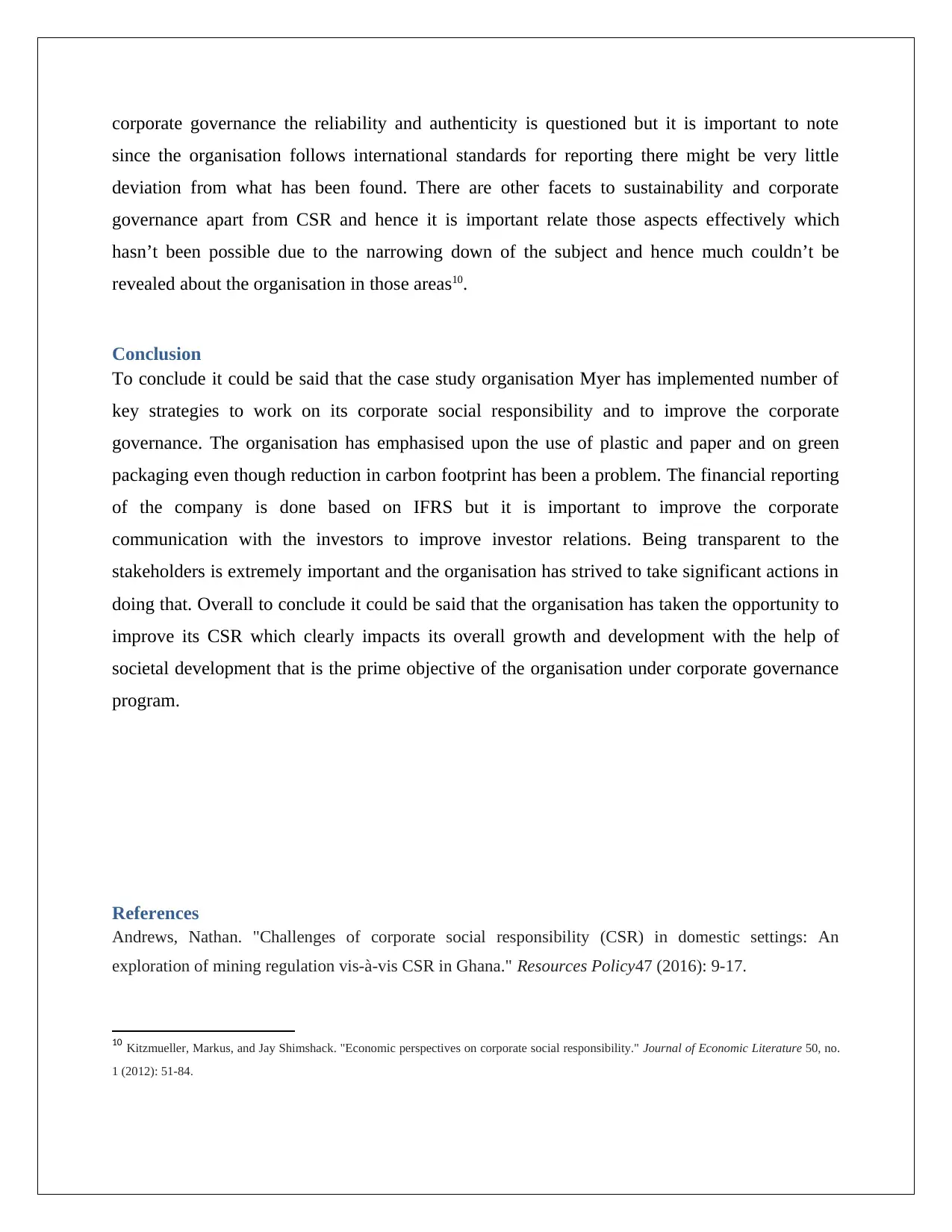
corporate governance the reliability and authenticity is questioned but it is important to note
since the organisation follows international standards for reporting there might be very little
deviation from what has been found. There are other facets to sustainability and corporate
governance apart from CSR and hence it is important relate those aspects effectively which
hasn’t been possible due to the narrowing down of the subject and hence much couldn’t be
revealed about the organisation in those areas10.
Conclusion
To conclude it could be said that the case study organisation Myer has implemented number of
key strategies to work on its corporate social responsibility and to improve the corporate
governance. The organisation has emphasised upon the use of plastic and paper and on green
packaging even though reduction in carbon footprint has been a problem. The financial reporting
of the company is done based on IFRS but it is important to improve the corporate
communication with the investors to improve investor relations. Being transparent to the
stakeholders is extremely important and the organisation has strived to take significant actions in
doing that. Overall to conclude it could be said that the organisation has taken the opportunity to
improve its CSR which clearly impacts its overall growth and development with the help of
societal development that is the prime objective of the organisation under corporate governance
program.
References
Andrews, Nathan. "Challenges of corporate social responsibility (CSR) in domestic settings: An
exploration of mining regulation vis-à-vis CSR in Ghana." Resources Policy47 (2016): 9-17.
10 Kitzmueller, Markus, and Jay Shimshack. "Economic perspectives on corporate social responsibility." Journal of Economic Literature 50, no.
1 (2012): 51-84.
since the organisation follows international standards for reporting there might be very little
deviation from what has been found. There are other facets to sustainability and corporate
governance apart from CSR and hence it is important relate those aspects effectively which
hasn’t been possible due to the narrowing down of the subject and hence much couldn’t be
revealed about the organisation in those areas10.
Conclusion
To conclude it could be said that the case study organisation Myer has implemented number of
key strategies to work on its corporate social responsibility and to improve the corporate
governance. The organisation has emphasised upon the use of plastic and paper and on green
packaging even though reduction in carbon footprint has been a problem. The financial reporting
of the company is done based on IFRS but it is important to improve the corporate
communication with the investors to improve investor relations. Being transparent to the
stakeholders is extremely important and the organisation has strived to take significant actions in
doing that. Overall to conclude it could be said that the organisation has taken the opportunity to
improve its CSR which clearly impacts its overall growth and development with the help of
societal development that is the prime objective of the organisation under corporate governance
program.
References
Andrews, Nathan. "Challenges of corporate social responsibility (CSR) in domestic settings: An
exploration of mining regulation vis-à-vis CSR in Ghana." Resources Policy47 (2016): 9-17.
10 Kitzmueller, Markus, and Jay Shimshack. "Economic perspectives on corporate social responsibility." Journal of Economic Literature 50, no.
1 (2012): 51-84.
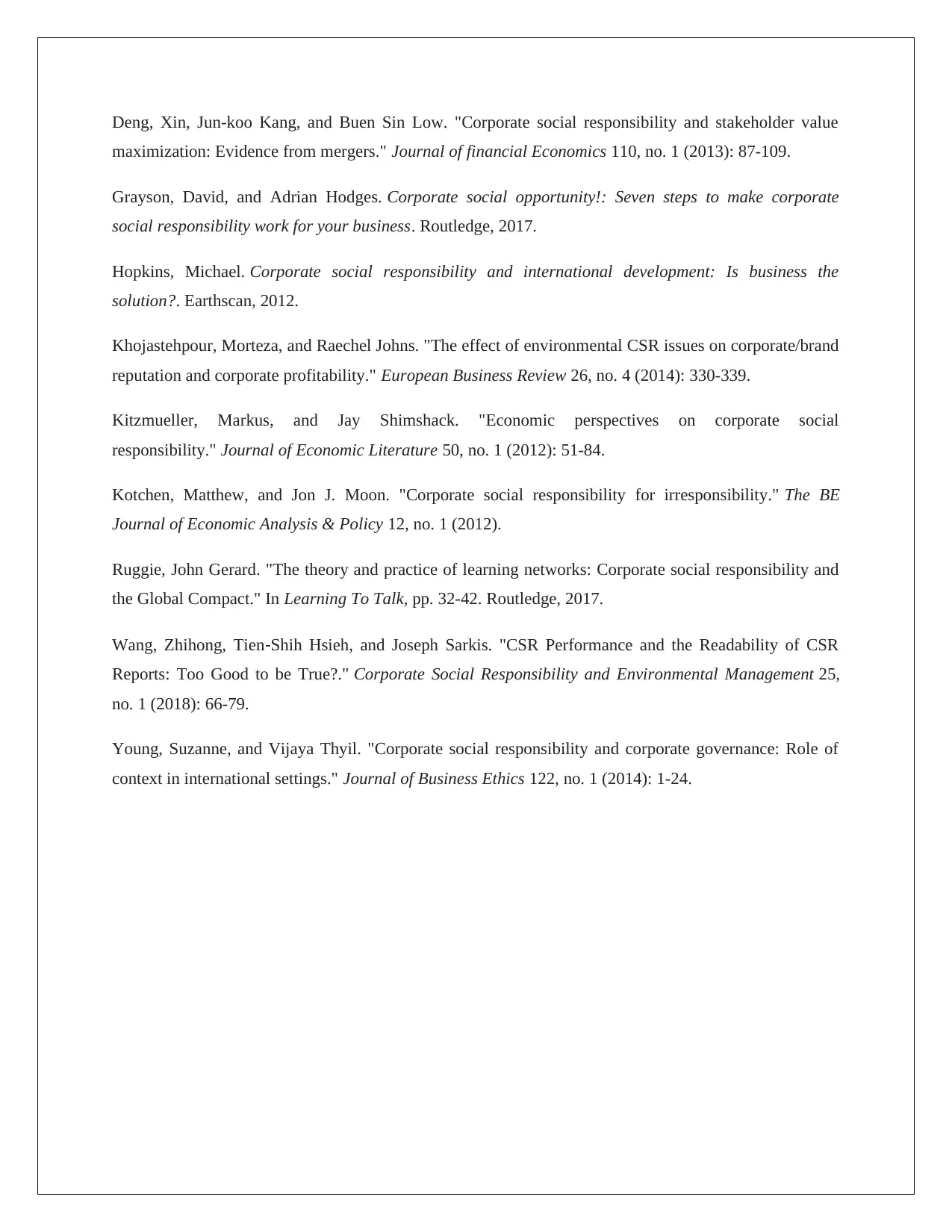
Deng, Xin, Jun-koo Kang, and Buen Sin Low. "Corporate social responsibility and stakeholder value
maximization: Evidence from mergers." Journal of financial Economics 110, no. 1 (2013): 87-109.
Grayson, David, and Adrian Hodges. Corporate social opportunity!: Seven steps to make corporate
social responsibility work for your business. Routledge, 2017.
Hopkins, Michael. Corporate social responsibility and international development: Is business the
solution?. Earthscan, 2012.
Khojastehpour, Morteza, and Raechel Johns. "The effect of environmental CSR issues on corporate/brand
reputation and corporate profitability." European Business Review 26, no. 4 (2014): 330-339.
Kitzmueller, Markus, and Jay Shimshack. "Economic perspectives on corporate social
responsibility." Journal of Economic Literature 50, no. 1 (2012): 51-84.
Kotchen, Matthew, and Jon J. Moon. "Corporate social responsibility for irresponsibility." The BE
Journal of Economic Analysis & Policy 12, no. 1 (2012).
Ruggie, John Gerard. "The theory and practice of learning networks: Corporate social responsibility and
the Global Compact." In Learning To Talk, pp. 32-42. Routledge, 2017.
Wang, Zhihong, Tien‐Shih Hsieh, and Joseph Sarkis. "CSR Performance and the Readability of CSR
Reports: Too Good to be True?." Corporate Social Responsibility and Environmental Management 25,
no. 1 (2018): 66-79.
Young, Suzanne, and Vijaya Thyil. "Corporate social responsibility and corporate governance: Role of
context in international settings." Journal of Business Ethics 122, no. 1 (2014): 1-24.
maximization: Evidence from mergers." Journal of financial Economics 110, no. 1 (2013): 87-109.
Grayson, David, and Adrian Hodges. Corporate social opportunity!: Seven steps to make corporate
social responsibility work for your business. Routledge, 2017.
Hopkins, Michael. Corporate social responsibility and international development: Is business the
solution?. Earthscan, 2012.
Khojastehpour, Morteza, and Raechel Johns. "The effect of environmental CSR issues on corporate/brand
reputation and corporate profitability." European Business Review 26, no. 4 (2014): 330-339.
Kitzmueller, Markus, and Jay Shimshack. "Economic perspectives on corporate social
responsibility." Journal of Economic Literature 50, no. 1 (2012): 51-84.
Kotchen, Matthew, and Jon J. Moon. "Corporate social responsibility for irresponsibility." The BE
Journal of Economic Analysis & Policy 12, no. 1 (2012).
Ruggie, John Gerard. "The theory and practice of learning networks: Corporate social responsibility and
the Global Compact." In Learning To Talk, pp. 32-42. Routledge, 2017.
Wang, Zhihong, Tien‐Shih Hsieh, and Joseph Sarkis. "CSR Performance and the Readability of CSR
Reports: Too Good to be True?." Corporate Social Responsibility and Environmental Management 25,
no. 1 (2018): 66-79.
Young, Suzanne, and Vijaya Thyil. "Corporate social responsibility and corporate governance: Role of
context in international settings." Journal of Business Ethics 122, no. 1 (2014): 1-24.
⊘ This is a preview!⊘
Do you want full access?
Subscribe today to unlock all pages.

Trusted by 1+ million students worldwide
1 out of 6
Related Documents
Your All-in-One AI-Powered Toolkit for Academic Success.
+13062052269
info@desklib.com
Available 24*7 on WhatsApp / Email
![[object Object]](/_next/static/media/star-bottom.7253800d.svg)
Unlock your academic potential
Copyright © 2020–2026 A2Z Services. All Rights Reserved. Developed and managed by ZUCOL.




